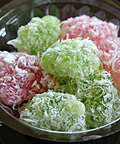Rice flour
(Redirected from Mochiko)
Rice flour is a form of flour made from finely milled rice. It is a staple ingredient in many cultures and is used in a variety of culinary applications, including baking, thickening sauces, and making noodles. Rice flour is particularly important in gluten-free diets, as it serves as a substitute for wheat flour for individuals with celiac disease or gluten intolerance.
Types of Rice Flour
There are primarily two types of rice flour: white rice flour and brown rice flour. White rice flour is made from white rice and has a mild flavor, making it suitable for a wide range of dishes. Brown rice flour, made from brown rice, retains the bran and germ, offering a nuttier flavor and higher nutritional content, including fiber.
Specialty Rice Flours
In addition to the basic types, there are also specialty rice flours, such as sweet rice flour (also known as glutinous rice flour or mochiko) and black rice flour. Sweet rice flour is made from sticky rice and is commonly used in Asian desserts and snacks. Black rice flour, made from black rice, is rich in antioxidants and has a deep purple color, adding a unique hue to dishes.
Culinary Uses
Rice flour can be used in a variety of culinary applications. It is a popular ingredient in Asian cuisine, used in making noodles, dumplings, and traditional sweets. In Western cuisine, rice flour is often used in gluten-free baking, serving as a substitute for wheat flour in bread, cakes, and cookies. It is also used as a thickening agent in soups and sauces.
Nutritional Profile
Rice flour is a good source of carbohydrates and provides a small amount of protein. Brown rice flour is higher in fiber compared to white rice flour due to the presence of the bran and germ. However, rice flour is generally low in vitamins and minerals, and those on a gluten-free diet are encouraged to ensure they receive a balanced intake of nutrients from other sources.
Health Considerations
For individuals with celiac disease or gluten intolerance, rice flour offers a safe alternative to wheat flour. However, it is important to note that rice flour lacks certain nutrients found in wheat flour, such as fiber and B vitamins, unless it is fortified. Additionally, rice flour has a high glycemic index, which may affect blood sugar levels.
Production
Rice flour is produced by milling rice grains into a fine powder. The process involves cleaning, soaking, grinding, and drying the rice. The quality of rice flour can vary depending on the type of rice used and the milling process.
Environmental Impact
The production of rice flour has an environmental impact, primarily related to the cultivation of rice. Rice cultivation requires a significant amount of water, and in some cases, the use of pesticides and fertilizers. Sustainable farming practices and organic rice varieties can help mitigate these environmental concerns.
Conclusion
Rice flour is a versatile and essential ingredient in both traditional and gluten-free cooking. Its various types and uses make it a staple in kitchens around the world. While it offers benefits for those with gluten-related disorders, it is important to consider its nutritional profile and environmental impact.
This article is a agriculture stub. You can help WikiMD by expanding it!
Transform your life with W8MD's budget GLP-1 injections from $125.
W8MD offers a medical weight loss program to lose weight in Philadelphia. Our physician-supervised medical weight loss provides:
- Most insurances accepted or discounted self-pay rates. We will obtain insurance prior authorizations if needed.
- Generic GLP1 weight loss injections from $125 for the starting dose.
- Also offer prescription weight loss medications including Phentermine, Qsymia, Diethylpropion, Contrave etc.
NYC weight loss doctor appointments
Start your NYC weight loss journey today at our NYC medical weight loss and Philadelphia medical weight loss clinics.
- Call 718-946-5500 to lose weight in NYC or for medical weight loss in Philadelphia 215-676-2334.
- Tags:NYC medical weight loss, Philadelphia lose weight Zepbound NYC, Budget GLP1 weight loss injections, Wegovy Philadelphia, Wegovy NYC, Philadelphia medical weight loss, Brookly weight loss and Wegovy NYC
|
WikiMD's Wellness Encyclopedia |
| Let Food Be Thy Medicine Medicine Thy Food - Hippocrates |
Medical Disclaimer: WikiMD is not a substitute for professional medical advice. The information on WikiMD is provided as an information resource only, may be incorrect, outdated or misleading, and is not to be used or relied on for any diagnostic or treatment purposes. Please consult your health care provider before making any healthcare decisions or for guidance about a specific medical condition. WikiMD expressly disclaims responsibility, and shall have no liability, for any damages, loss, injury, or liability whatsoever suffered as a result of your reliance on the information contained in this site. By visiting this site you agree to the foregoing terms and conditions, which may from time to time be changed or supplemented by WikiMD. If you do not agree to the foregoing terms and conditions, you should not enter or use this site. See full disclaimer.
Credits:Most images are courtesy of Wikimedia commons, and templates, categories Wikipedia, licensed under CC BY SA or similar.
Translate this page: - East Asian
中文,
日本,
한국어,
South Asian
हिन्दी,
தமிழ்,
తెలుగు,
Urdu,
ಕನ್ನಡ,
Southeast Asian
Indonesian,
Vietnamese,
Thai,
မြန်မာဘာသာ,
বাংলা
European
español,
Deutsch,
français,
Greek,
português do Brasil,
polski,
română,
русский,
Nederlands,
norsk,
svenska,
suomi,
Italian
Middle Eastern & African
عربى,
Turkish,
Persian,
Hebrew,
Afrikaans,
isiZulu,
Kiswahili,
Other
Bulgarian,
Hungarian,
Czech,
Swedish,
മലയാളം,
मराठी,
ਪੰਜਾਬੀ,
ગુજરાતી,
Portuguese,
Ukrainian
Contributors: Prab R. Tumpati, MD









